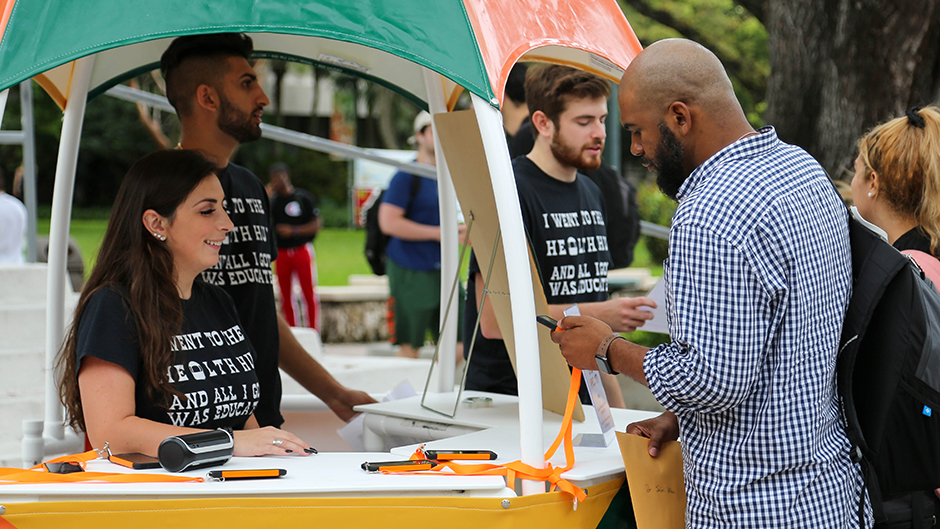The William W. Sandler Center for Alcohol and Other Drug Education’s dedication to outreach, service, and leadership earned it the Outstanding Peer Education Group award at this year’s Region III National Association of Student Personnel Administrators (NASPA) Spring Conference.
Each year, NASPA recognizes groups with this award for their overall impact, diversity and scope, membership recruitment and retention, service to the community, student leadership, campus and community relations, creativity and overall effectiveness. With weekly programs, peer-led workshops, and social media campaigns in collaboration with 17 departments and student organizations, the Sandler Center makes an impact on campus that is intentionally far-reaching.
“The peer educator team is deserving of this award because our programs have consistently proven to be successful and record breaking,” Rachel Askowitz, the Sandler Center’s graduate public health intern, wrote in her nomination. “When the Health Hut initiative launched in the 2017-2018 academic year, we averaged about 60 students per event. This 2018-2019 peer education team has surpassed that exponentially, averaging 100 students per event.”
The Health Hut is one of the groups most visible and impactful initiatives. It pops up on heavily trafficked, focal points of campus and not only provides students with relevant information on alcohol and other drugs, but it also acts as a referral source for other University of Miami health and wellness initiatives.
“We’re students too and we’re trying to teach our fellow students about different dangers and how to be safe during their time here,” senior peer educator Milind Khurana, says. “If someone leaves with one nugget of information that could potentially save their life or someone else’s, that’s a win.”
Diversity within the peer educator team serves as an advantage to The Sandler Center, allowing for a more extensive and meaningful exposure to distinct aspects of student life. With academic interests from business to nursing to political science and involvements in Student Government, Greek life, Hillel, Scuba Club, and more, peer educators provide a continuous influx of creativity and innovation by listening to the students around them and adapting their programming and facilitation work based on the feedback.
“Peer educators exemplify what it means to be a student and community leader. They are role models for other students in more ways than one,” said Askowitz. “With every opportunity, our peer educators work to consistently lead others to think critically about their actions and how their health choices now, will serve to impact them in the future.”
In addition to celebrating the increasing number of students they reach with their initiatives, peer educators also recognize a peer-to-peer approach on the topic of alcohol and other drugs is especially important in delivering a message that resonates with students.
“Most people on campus don’t really get information on drugs easily,” peer educator Bobby Chabloz, says. “We can reach a lot of students this way, more than what is normally possible with fixed events in the office where we’re only educating people who come in for offenses. Just educating them on the simplest things could change their behaviors drastically.”
The Sandler Center is currently accepting Peer Educator Applications for the 2019-2020 academic year. Current students can apply for this paid leadership position in the Dean of Students Office that includes national conference attendance, programming skills development, and research opportunities.

